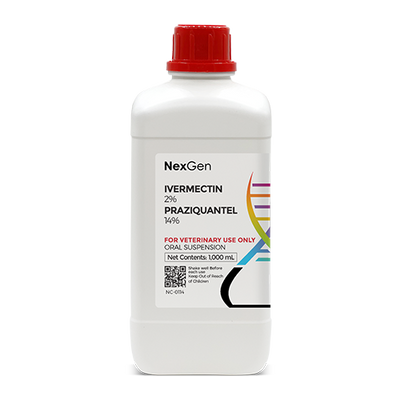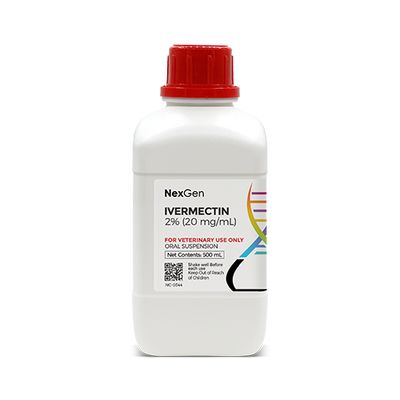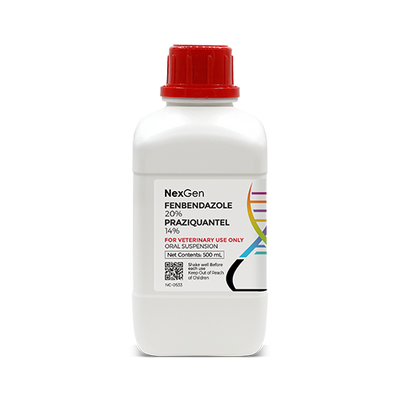
Ivermectin 2% + Fenbendazole 20%, Oral Suspension, 1000mL
Login for pricing
- Brand
- Mixlab
- SKU:
- NC-0113
- Product Type:
- Suspension
- Size:
- 1000ml
- Administration:
- Oral
- Therapeutic Class:
- Antiparasitic
Ivermectin is a drug mixture of two structurally semisynthetic lactones that is used in veterinary medicine as an anthelmintic, boticide, acaricide, and insecticide. Ivermectin has a broad spectrum of activity against intestinal and insect parasites, and kills migrating larvae.1 Ivermectin is widely prescribed by veterinarians in all horse deworming programs because of its efficacy.
Ivermectin is known to provide effective broad spectrum control of bots, habronema, ascarids, strongyles, thread worms, pinworms, tape worms, lung worms, and is also effective against the filaria of Onchocerca, larvae of habronema, and arterial larvae stages of strongyles.
Fenbendazole is a broad spectrum anthelmintic that is used to control a number of common equine parasites, including large strongyles (Strongylus edentatus, S. equinus, S. vulgaris), encysted early third stage (hypobiotic), late third stage and fourth stage cyathostome larvae, small strongyles, pinworms (Oxyuris equi), ascarids (Parascaris equorum), and arteritis caused by fourth stage larvae of Strongylus vulgaris.2
Fenbendazole is considered to be an extremely safe wormer by veterinarians. According to the available literature, it is able to withstand overdoses of 100-200 times the standard dose without causing harm to the horse. For this reason, fenbendazole is often used to clear immature parasites, which are often resistant to worming medications due to their slower metabolism.
Fenbendazole is used as a part of a veterinary reviewed and approved program of parasite control. This program may include a multi-dose regime over a period of days specifically to control of the migrating larvae of S. vulgaris.2
Fenbendazole is known to be effective against:
- Redworms
- Pinworms
- Roundworms
- Stomach hair worms
- Large-mouthed stomach worms2
Swelling and itching reactions after treatment with ivermectin have occurred in horses with heavy infections of neck threadworm microfilariae.1 In horses, no side effects for a single dosage of Fenbendazole as high as 454 mg/lb were noted.2
Since equine dewormers have been known to be toxic to dogs and cats, cleaning of barn aisles, wash-racks, etc. is recommended after administration, particularly in operations in which dogs and/or cats are known to be present.
In combination, Ivermectin 2% / Fenbendazol 20% 1000 ml by NexGen provides a comprehensive anthelmintic/deworming solution for your equines.
FOR RX ONLY: A valid prescription from a licensed veterinarian is required for dispensing this medication.




















